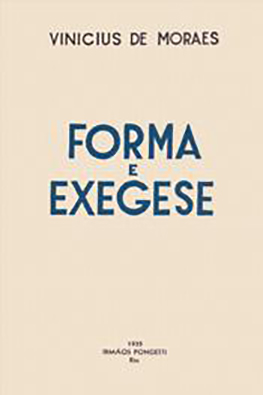
Form and Exegesis marks the continuity of Vinicius de Moraes' career as a poet. Still 22 years old, it was the second book by the young man who still clung to Symbolism as a favorite school when writing verses or choosing themes. The book's various dedications to Arthur Rimbaud, Mallarmé, Claudel or Jacques Riviére seal the young poet's alliance with his French literary matrix and show us the poetic affiliation that Vinicius still cultivated. Despite the Symbolist universe and its connection with the Catholic intellectual milieu of Rio de Janeiro, the book presents some first steps in poetics that would be common in the future. Poems such as “Ilha do Governador”, about his childhood in the Rio neighborhood, or “The return of the morena woman” stand out from the long hermetic and transcendental verses. They already point to a more tangible and everyday Vinicius, which, nevertheless, would give his expression even more beauty and depth.
